Finn’s Unfulfilled Potential: The Failures of The Rise of Skywalker, Part 4
Although the Sequel Trilogy had its storytelling inception in the origin story of a female Jedi, the character had a male companion on her journey from the start, too. Concept art and story ideas for Kira and Sam evolved into Rey and Finn. By the time The Force Awakens hit theaters, it had become the first Star Wars movie to bring two characters, not just one, through the stages of Joseph Campbell’s monomyth on their Hero’s Journey in the same movie. Concurrently with Rey’s transformation from Jakku scavenger to Jedi apprentice seeking training from Luke Skywalker, Finn leaves behind his ordinary world as a brainwashed First Order stormtrooper and becomes a hero fighting for the good side who follows his conscience and thinks for himself. Their arcs continued in The Last Jedi: Rey learns that the future of the Jedi lies not in restoring a lost hero, like Luke or Ben Solo, but within Rey herself; Finn learns to care beyond his own world, not simply trying to save Rey or himself from the terror of the First Order but committing himself to the cause of the Resistance in fighting for peace and justice for everyone in the galaxy.
In The Rise of Skywalker, however, Finn has no significant character arc to parallel Rey’s. And that is only one of the ways in which the movie fails to fulfill the potential for the Sequel Trilogy’s male heroic lead. What could have been an epic culmination to Finn’s story instead ends with an underwhelming denouement.
Freezing Finn’s Character Development
In stark contrast to the first two films in the trilogy, The Rise of Skywalker provides no meaningful character arc for Finn. He begins the movie as a fully dedicated Resistance operative, and never wavers in that loyalty to the end. He helps recruit Jannah to a cause he already believes in. He gains a battlefield promotion to help Poe lead the Resistance forces in the final battle, but that merely ratifies their friendship; it is not earned by any particular progression in Finn’s character development. As the battle rages, Finn makes the same suicide-mission choice again: a futile attempt to duel Kylo Ren to save Rey in The Force Awakens, a doomed ski speeder charge at the First Order cannon to save the trapped Resistance survivors in The Last Jedi, and the destruction of the Steadfast without any means to evacuate to save the galaxy from the Final Order in The Rise of Skywalker. Unlike Rey, who has progressed through the third phase of Campbell’s monomyth, Finn ends the movie the same as how he started it.
Ironically, the closest comparison to Finn’s story arc fate in The Rise of Skywalker is probably Han Solo in Return of the Jedi – but without the core conceit that made Solo’s story work in that film. In A New Hope, Han starts the story as a self-centered smuggler and ends it by returning to save Luke from Darth Vader in the Death Star trench run; in The Empire Strikes Back, Han has an extended romance subplot with Leia that culminates in his acceptance of his carbonite fate at Cloud City. In Return of the Jedi, though, the story focuses on Luke’s quest to redeem his father to the exclusion of everyone else. Han’s and Leia’s characters are basically static: after his rescue from Jabba’s palace, they are loyal Rebellion commanders and mission partners for the Endor operation. The Rise of Skywalker functions the same way with Finn and Poe. With the story focusing its character arcs exclusively on Rey and Kylo Ren, that leaves Finn and Poe static while they undertake a series of missions to help the Resistance win the war.
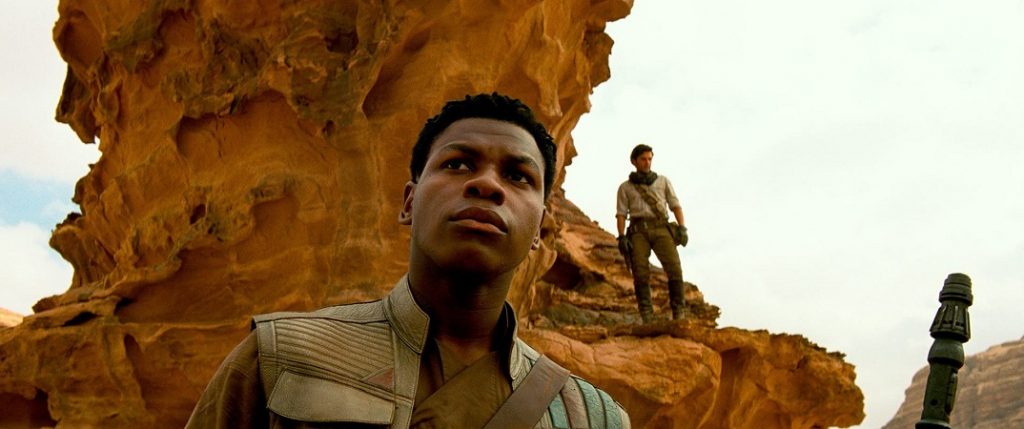
But Return of the Jedi is quite clear that Han and Leia are also romantic partners. Unlike early in Empire, when Leia (dubiously) claims to care only about Han’s value to the Rebellion, in Return of the Jedi there is no doubt that she rescues him from Jabba because she loves him. Likewise, though Han is now committed to the cause, it is clear he does it mostly (if not entirely) because of his love for Leia (and Luke) rather than philosophical or political reasons. Though their character arcs are static, playing out the conclusion of the Han-Leia romance provides an emotional catharsis to the audience who has watched their relationship evolve over three films. By contrast, The Rise of Skywalker omits any romantic angle for Finn and Poe. They are bantering buddies when they first meet in The Force Awakens, and that is how they conclude The Rise of Skywalker. There is no catharsis, no payoff to a progression built across three films, to earn an emotional reward for the audience that counterbalances their static character arcs. Moreover, recent comments from key principals, Oscar Isaac in particular, demonstrate that the possibility of an overtly romantic capstone for Finn and Poe was known to the creative team. Whether it ever moved beyond a suggestion into serious consideration as a component of the story is a secret of the production process that remains hidden at this time.
Finn and the Force
On Pasaana, the heroes escape pursuit by the First Order only to end up trapped in the sinking fields adjacent to Ochi’s long-lost starship. Moments before they plunge into the depths, Finn exclaims to Rey that he never got to tell her… something left unsaid. After The Force Awakens created and progressed their relationship, and each was shown thinking about the other while they were separated for the entirety of The Last Jedi, the opening scenes of The Rise of Skywalker reinforced the familiarity, trust, and affection between Finn and Rey. Recognizing the similarity to the brink-of-death-confession trope often used in romantic arcs, especially when followed up by Poe’s zinger of jealousy in the tunnel minutes later, some fans wondered if Finn had intended to express romantic feelings for Rey.
Finn’s secret, though, involves a different kind of feelings – the Force. Several times during the film, Finn’s instincts lead him in the right direction, sometimes accompanied by John Williams’ Force Theme as a musical clue, as well. Talking to Jannah, Finn verbalizes these subconscious intuitions as guidance from the Force. He also tells Poe that he and Leia can understand Rey’s struggle in a way Poe cannot. Most overtly, Finn reacts to Rey’s death on Exegol with the same physical and emotional response as Obi-Wan Kenobi sensing Alderaan’s destruction in A New Hope, Yoda feeling Order 66 in Revenge of the Sith, and Leia sensing Kylo Ren’s murder of Han Solo in The Force Awakens. In the aggregate, the movie reveals that Finn’s secret is his recognition of his connection to the Force. (In subsequent public comments, both J.J. Abrams and John Boyega have confirmed that this is the interpretation intended by the filmmakers.)
This story point ought to have been – to redeploy Han Solo’s nickname – a big deal in the movie. The supernatural gifts and dangers inherent in the Force are one of the core identifying aspects of the Star Wars franchise. Jedi, Sith, and other Force-users are the superheroes and supervillains of Star Wars. More than that, revealing that Finn is Force-sensitive frames the entire trilogy in a whole new light – the “awakening” in the first film takes on a different connotation.
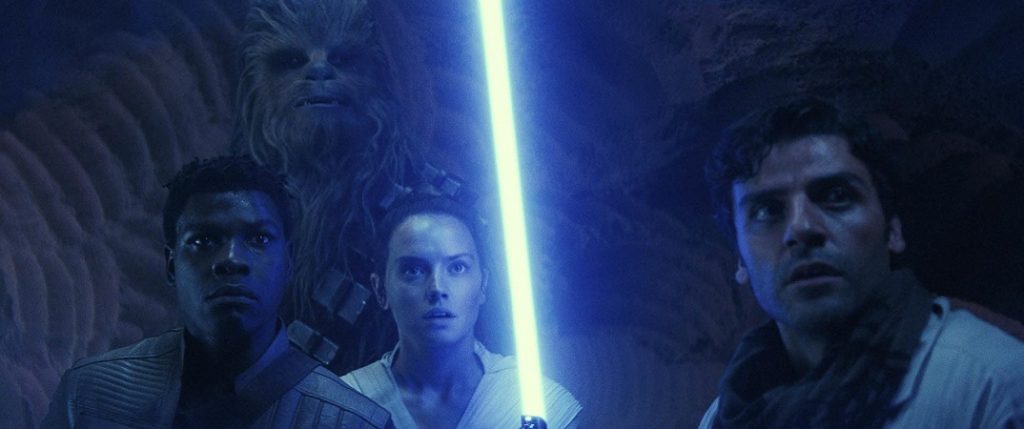
Instead, Force-sensitive Finn has no meaningful payoff. Other than a deus ex machina intervention to redirect Finn’s cavalry assault from the originally targeted ground navigation antenna to the antenna on the Steadfast, his ability to touch the Force plays no role in his plotline or character development. He does not, for example, use telekinesis or telepathy. He does not alter his motivations or choices because of his newfound exposure to the temptations of the dark side. He does not ask Leia or Rey to teach him the ways of the Jedi. Though he did so twice in The Force Awakens, Finn does not wield a lightsaber in The Rise of Skywalker, only holding Rey’s ignited weapon briefly while she heals the injured serpent. In the end, Finn is strong in the Force, but it means nothing to how his story concludes.
Finn and the First Order
In the early development of The Force Awakens, Larry Kasdan proposed the idea that Sam should be a stormtrooper deserter. The idea stuck, and became central to Finn’s identity. Dialogue between Phasma and Hux emphasizes how unusual it is for a stormtrooper to break the First Order’s brainwashing. After overcoming his selfish urge to flee to the far reaches of the galaxy, Finn uses his expertise and experience from his First Order past to infiltrate Starkiller Base and help the Resistance destroy it, formulate a plan to disable the hyperspace tracking by the Supremacy, infiltrate Snoke’s flagship to carry out the plan, sneak through the Steadfast to rescue Chewie, and countermand one of the warship’s turbolasers to fire upon its own bridge.
When it comes to the thematic resolution of the war against the First Order in The Rise of Skywalker, though, Finn’s backstory is given short shrift. On Kef Bir, Finn meets Jannah and learns that her group of orbak riders also are First Order deserters, an entire company of stormtroopers who mutinied in the face of orders to kill innocents. On its face, this certainly seems to make Finn’s actions at Jakku far less special or unusual. Perhaps we are meant to infer that word of Finn’s defection is what inspired Jannah and her peers to resist: when Finn responds to Jannah’s TZ-1719 designation with his own FN-2187, she exclaims “You!” in return. But the film leaves it ambiguous whether Jannah is reacting generally to the revelation that Finn is a former stormtrooper too, or whether she is reacting to who he is specifically. The latter would be thematically powerful, but it is left unclear. (Unfortunately, The Rise of Skywalker Visual Dictionary includes multiple references to Jannah and her group having lived on Kef Bir for a number of years, indicating their desertion predates Finn’s; the events of The Force Awakens occur a year before The Rise of Skywalker.)

The movie then reflects a strange thematic dissonance by the filmmakers. Finn and Jannah refer to being abducted as children and brainwashed by the First Order. At the end of the film, Jannah tells Lando she has no idea what system she originally hails from. Dialogue in the conference room on the Steadfast, and between Zorii Bliss and Poe at Kijimi, further reinforces that the First Order continues its involuntary conscription of children across the galaxy. The relative youth of the Sith fleet officers aboard the warships at Exegol likewise reflects this. Yet Finn then readily co-leads the Resistance attack, which has as its objective the defeat of the entire Exegol fleet. During the battle, the Resistance starfighters follow the recommendation of Rose Tico and attack the main ventral cannons, which causes each Star Destroyer to erupt in a catastrophic explosion. Despite his own past and direct knowledge of who makes up the Final Order military, Finn inexplicably has no qualms about killing tens of thousands of them.
An alternative was readily available and familiar among the fandom. After The Force Awakens, and especially after his subplot with Rose in The Last Jedi, fans speculated that Finn’s arc might conclude with him helping to win the war not by defeating the First Order forces in battle, but by reaching the hearts and minds of his erstwhile peers in the stormtrooper corps. Finn could be a symbol of the power of the human spirit to break past indoctrination, oppression, and fear. Finn could inspire others to refuse their evil and unjust orders. (Especially if the Visual Dictionary reflects the filmmakers’ intent regarding Jannah’s group, such that Finn’s defection was not unique or unprecedented, then the seeds of a large-scale ceasefire already were built into the story.) As Obi-Wan tells Han in A New Hope, “There are alternatives to fighting.” Love is stronger than hate – and Finn more than anyone could have helped lead the Resistance to victory on that basis, instead.
Finally, The Rise of Skywalker seemingly forgets about Finn’s history with the Sequel Trilogy’s principal antagonist, Kylo Ren. His other rivalry, with stormtrooper corps commander Captain Phasma, plays out across the mission to Jakku and the infiltration of Starkiller Base in The Force Awakens, followed by their reunion and fateful single combat on the Supremacy in The Last Jedi. Similarly, Finn and Kylo Ren are deliberately juxtaposed in The Force Awakens: Ren orders the massacre and Finn refuses to execute it, and they share a meaningful glance in the Jakku village; Finn liberates Ren’s prisoner, Poe Dameron; Finn helps BB-8 escape Jakku, thwarting Ren’s pursuit; Finn respects and befriends Han Solo, before Ren murders him; Finn fights with the blue lightsaber, Ren with a red one. Each time Finn makes the choice to be good, and Kylo Ren chooses evil. Although they do not cross paths in The Last Jedi, they certainly are acting at cross-purposes: Finn’s motivation throughout the movie is to keep Rey safe, while Kylo Ren’s is to turn her to the dark side; Finn fights to save the Resistance, while Ren’s goal is to destroy it. Yet in The Rise of Skywalker, this juxtaposition is functionally absent. The battle to save the galaxy from evil conquest – the fight that Finn and Poe wage – is refocused from Supreme Leader Ren and the First Order to the returned Emperor Palpatine and his massive Final Order fleet at Exegol. The battle for the Supreme Leader’s soul is a spiritual clash among Kylo Ren, Ben Solo, Rey, Leia, and Palpatine. The man who refused Ren’s genocidal orders, who Ren sliced across the back and left for dead, who represents the power to choose good over evil no matter your circumstances – Finn is given no role to play in determining Kylo Ren’s fate.
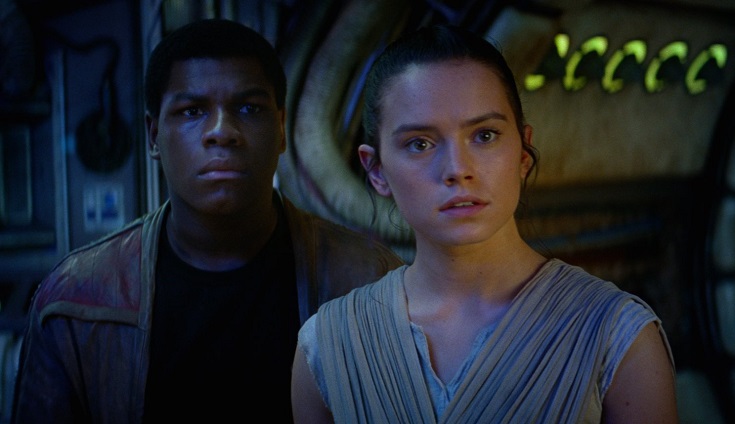
Who Are You?
In December 2014, a full year before The Force Awakens reached theaters, Lucasfilm revealed names for the new characters shown in the first teaser trailer for the film – and fans immediately noticed the conspicuous absence of surnames for Rey and Finn. The mystery continued in the lead-up to the movie, including the Journey to The Force Awakens publishing releases. The movie itself explained one name – Poe Dameron’s rejection of the First Order’s alphanumeric designation in favor of calling his new ally Finn – but left Rey’s unanswered. That absent surname in part fueled ongoing speculation about Rey’s origins, and though The Last Jedi addressed her parentage in dialogue, she never spoke her parents’ surnames or resumed one she had previously used.
In hindsight, of course, this path for Rey’s name aligns with the conclusion of her story arc in The Rise of Skywalker. Maintaining her name as “just Rey” (or the “Rey of Jakku” used on some toys and merchandise) over two films left an easy opening not only for the revelation of her familial origin as Rey Palpatine, but also her repudiation of that heritage and adoption of a new legacy as Rey Skywalker. Rather than Rey changing her name, she simply adds a second one.
Simultaneously, however, The Rise of Skywalker takes not even a moment to bring Finn’s parallel journey to a close. Rey the scavenger orphan becomes Rey Skywalker, but FN-2187 the stormtrooper defector remains stuck at Finn. No thematic reason for this difference is readily apparent; the strongest inference is inattention or neglect. If Rey can chose to become a Skywalker, Finn’s story equally would have earned Solo or Organa as a sign of respect, admiration, and love. Or, to make an even greater statement, Dameron. But The Rise of Skywalker does none of these. Like so much else in the movie, the potential power in Finn’s story was left unfulfilled.
Related Links:
- ‘Star Wars: The Rise of Skywalker’: Finn and Poe Aren’t Boyfriends, but J.J. Abrams Hints at LGBTQ Representation (Adam B. Vary, Variety; Dec. 3, 2019)
- Subtle ‘Rise of Skywalker’ Moment Confirms ‘Star Wars’ Fan Theory (Rosie Knight, The Hollywood Reporter; Dec. 21, 2019)
- Star Wars: J.J. Abrams Reveals Finn’s Unspoken Rise of Skywalker Secret (Rachel Labonte, Screenrant; Dec. 21, 2019)
- Star Wars: Oscar Isaac Says ‘Disney Overlords Weren’t Ready’ for Finn/Poe Romance (Laura Prudom, IGN; Dec. 23, 2019)
- ‘The Rise of Skywalker’ failed to care about Finn’s story. That’s a problem. (Chris Taylor, Mashable; Dec. 25, 2019)
- Star Wars: Oscar Isaac ‘pushed’ for Poe-Finn romance, but ‘Disney overlords’ weren’t ready (Josh Weiss, Syfy.com; Dec. 27, 2019)
- What Was Finn Trying to Tell Rey in Star Wars: The Rise of Skywalker? (Matt Fowler, IGN; Dec. 30, 2019)
- The Rise of Skywalker leaves the Jedi in a state of confusion (Siddhant Adlakha, Polygon; Jan. 7, 2020)
- BJ Priester Talks The Acolyte Episode 6 on Who’s the Bossk? - July 7, 2024
- Dave Filoni Talks Writing AHSOKA and Guiding the Future of Star Wars Storytelling - June 21, 2024
- Lessons in Franchise Management – MCU: The Reign of Marvel Studios - January 14, 2024

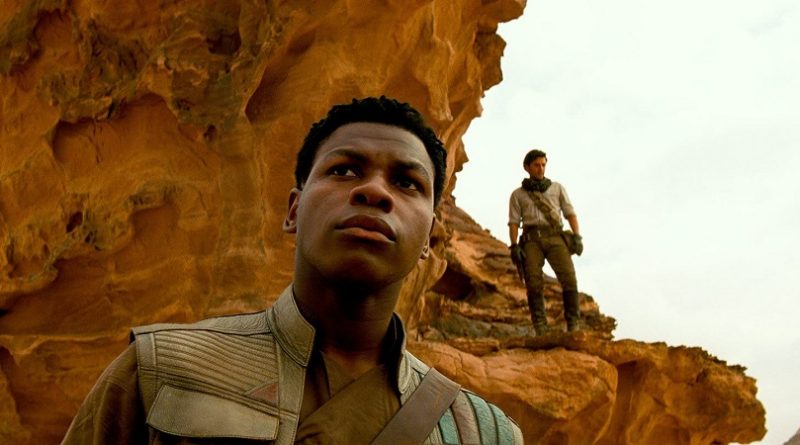







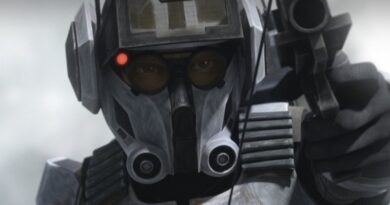

Pingback:The Failures of The Rise of Skywalker, Part 6 – FANgirl Blog